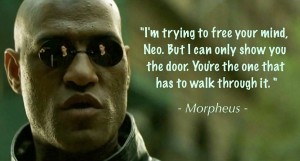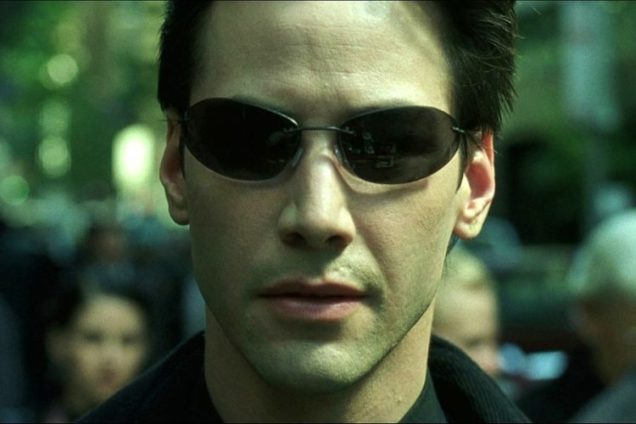Today’s student essay for THEOREL 101/G (our Bible and Popular Culture course) comes from Dario Davidson. Dario has taken that well known biblical story of Adam and Eve’s temptation (Genesis 3) and read it alongside the movie, The Matrix. The result? A wonderfully creative analysis of both the film and the biblical narrative, which brings new meaning and insights to both texts.
So read on, and enjoy!

Adam and Eve Chose the Red Pill
Dario Davidson
The Garden of Eden is an integral part of the Bible in modern culture. The dramatic conclusion of Genesis is the backdrop for what is now universally known as “Original Sin”. Adam and Eve’s choice represented God’s creation rebelling for the first time by succumbing to temptation and consuming the forbidden fruit. This story has a long and diverse cultural afterlife. In 1999, in a radical retelling of Genesis Three, the dystopian science fiction film “The Matrix” was released. Based on The Wachowski brothers’ 1997 script, it encompassed the ongoing debate regarding artificial intelligence, with a strong anchor in Descartes’ original venture into metaphysics. The Matrix confronted audiences with the uncomfortable possibility that reality was an entirely subjective term. Beyond the initial focus on robots and digital worlds, it becomes clear that this story is a bold reimagining of Mankind’s fall from grace. It did so by invoking the same fundamental thematic setting and character arcs but presented them from an inverted perspective.
Our Eden in this case is a computer-generated simulation of late twentieth century Earth, known as The Matrix, being simultaneously experienced by all humans. The Matrix’s version of God is the Artificial Intelligence. It is a multitude of entities driven by a single consciousness, with a stranglehold on the reality of every living person. It exerts its will through a host of programs, one of which is Agent Smith. Adam and Eve are clearly manifested in the Matrix’s protagonist, Thomas and his love-interest, Trinity. No Garden of Eden is complete without a serpent. The Matrix gives us Morpheus: a man both vilified and hunted by A.I., it is he who presents Thomas with the forbidden fruit of knowledge. All the fundamental characters are being represented. Upon closer inspection it becomes clear that The Matrix and Genesis Three have thematic similarities that are clearly more than coincidental.

“So, the lord God caused the man to fall into a deep sleep” (Genesis 2:21)
Before Eve, Adam was not alone in the garden. He was surrounded by all the animals God had created and lived among them. Despite this, he feels lonely and incomplete. “But for Adam, no suitable helper was found.” (Genesis 2:20). Eve is made while Adam sleeps. It is the creation of his paramour that eases his restlessness. Thomas A. Anderson is a computer programmer living in New York city. He is painfully ordinary, and like most technologically-inclined people of the late nineties, a loner. He lives in The Matrix, unaware of the world outside of it. He is surrounded by people, but ultimately isolated from them. In the first act of The Matrix, several scenes show Thomas waking from various dreams. They are intentionally shown to confuse the viewer between what is a dream and what is reality. Upon waking from one such dream-like experience, Thomas meets Trinity, who, as well as having an obviously biblical name, comes to him with the temptation of true knowledge. Much like Eve did in Genesis 3, she tells him that knowledge lies in defiance of the law. The crucial turning point for Thomas in the first act of the Matrix is his decision to trust Trinity over the authorities of the world. He knows she is a notorious, criminal computer hacker. Despite this, his thirst for knowledge pushes him to trust her at the risk of being “exiled” from society. Adam knew that the consequence of disobeying God would be severe, but he trusted Eve and sought truth over compliance.
“Now the serpent was more crafty than any of the wild animals the Lord God had made” (Genesis 3:1).
The serpent has long been branded the culprit behind mankind’s first temptation. He lurked in the shadows, relying on wit and cunning instead of brawn. It is towards the climax of the first Act that Trinity brings Thomas to Morpheus. Morpheus, in Greek mythology, refers to the God of dreams; a shrewd title for the man who seeks to free Thomas from the ‘dreamworld’ of The Matrix. Morpheus is relentlessly hunted by A.I for his ongoing defiance. During his interrogation of Thomas, Agent Smith describes Morpheus as “the most dangerous man alive”. Although it is clear that the A.I. considers Morpheus an adversary, he is not Satan. Indeed, Genesis never claims that the serpent is Satan either. It is only a much later Christian tradition to describe the serpent as synonymous with Satan (Tate, 1992). However, Morpheus does fulfil virtually the exact role as the serpent in Eden, by acting in direct opposition to the will of God.

First, Morpheus finds Trinity, who in turn, finds Thomas and tells him that she knows the answers he has been seeking. In Genesis, Eve ate the fruit first, and then tempted Adam. In the climax of the first act, we see Morpheus offer Neo two pills, the red pill and the blue pill. The red pill represents the tree of knowledge from the Garden. Morpheus promises Neo that he offers him “The truth, nothing more”. The blue pill will return him to his life of ignorant bliss. Here, it is Morpheus who acts as the archetypal challenger of faith. Morpheus and the serpent even have the same view of the Garden, perceiving it as a restriction of liberty instead of a paradise. This is heavily reflected in the choice of words used by Morpheus upon freeing Thomas. The serpent says, “For God knows that when you eat from it your eyes will be opened” (Genesis 3:5). When Thomas first exits The Matrix, he asks why his eyes hurt, to which Morpheus replies “you’ve never used them before”.
“But you must not eat from the tree of the knowledge of good and evil, for when you eat from it you will certainly die.” (Genesis 2:17).”
In Genesis, God makes laws based on a lie and deceives Adam and Eve about the nature of their existence. Upon eating the fruit, they do not die but instead realize the nature of their reality; in this instance, that they are naked. Whether or not being naked in Eden is bad or good is a moot point. The fact is that it is true,and they now recognize it as such.

When Thomas is initially awoken from the artificial world inside The Matrix, he sees the true hellscape that the real world has become. The sky is blackened with thick clouds of smoke. The ground is scorched and devoid of all life. Having lived in a simulation of relative peace his whole life, the sight before him rocks him to his core. He has ceased to live in the Matrix and is now aware of the true nature of reality.
The A.I. has removed humanity’s burden of existing in a polluted and desolate world by trapping them inside The Matrix. The few humans who have escaped live harsh, fearful lives compared to their enslaved counterparts. When Adam and Eve are exiled, God inflicts suffering upon them in the form of painful childbirth, and a life of labour. But like Adam, to Thomas, truth is more important than comfort. Thomas resents the A.I. for keeping humans ignorant and seeks to free them all. God wanted subservience from mankind in exchange for their peaceful and oblivious existence. This is the nature of the A.I. controlling the Matrix: it only seeks to exploit people for the power they can provide it. Much like an all-powerful God demanding unquestioning obedience and worship, its power within the Matrix is virtually limitless. By illustrating Thomas and the rest of humanity as slaves, the Wachowskis were trying to challenge the usual depiction of Adam and Eve’s disobedience not as a failure, but instead as a revolution against tyranny.

The Matrix can provide a new way of examining Genesis 3 for modern audiences. Through the depiction of a disillusioned and incomplete man, we get an understanding of Thomas’ yearning for truth. Despite his relative comforts and luxuries, there is a profound lack of meaning in his life. It was Trinity who came to him with the promise of fulfilment and truth. Morpheus gave Thomas the chance to opt out, and to continue living as a servant, but Thomas was compelled to seek answers. The A.I fulfilled its role as the great deceiver, imprisoning the entire human race out of self-interest. Omnipotent and omnipresent, it was swift to exact judgement on humans it deemed disobedient. Through their script, the Wachowskis were trying to illustrate the immorality of Genesis Three. The fact that mankind was deceived from the start suggests not benevolence on God’s part but an egocentric agenda. Adam and Eve chose the ‘red pill’, were cursed by God, and cast out of Eden forever. Adam was forced to labour and work the earth while Eve suffered terrible pain in bearing children. Nevertheless, they were together, and they knew truth.
THOMAS/NEO “I can’t go back, can I?”
MORPHEUS “No. But, even if you could, knowing what you know now, would you really want to?”

Bibliography
Tate, M. E. (1992). Satan in the old testament. Review & Expositor, 89(4), 461-474.
Wachowski, Andrew. Wachowski, Larry. (1996) The Matrix. “IMSDB”. Retrieved from URL.